Comparative Analysis of H.G. Wells' The War of the Worlds
VerifiedAdded on 2022/10/11
|5
|1350
|14
Essay
AI Summary
This essay offers a comparative analysis of H.G. Wells' "The War of the Worlds," exploring the parallels between the Martian invasion and British imperialism. The essay begins by summarizing the novel's plot, focusing on the Martians' invasion of Earth due to resource scarcity, mirroring the colonial practices of European powers, particularly Britain. The author argues that the novel reflects the imperialist mindset of the time, where powerful entities exploit weaker ones for resources and dominance. The essay highlights similarities in the motivations and actions of the Martians and the British imperialists, focusing on their superior strength and disregard for the impact of their actions on the invaded populations. The essay concludes by emphasizing the novel's relevance in highlighting the destructive nature of war and aggression, urging readers to consider the implications of such conflicts on human lives. The essay uses various sources to support the arguments.
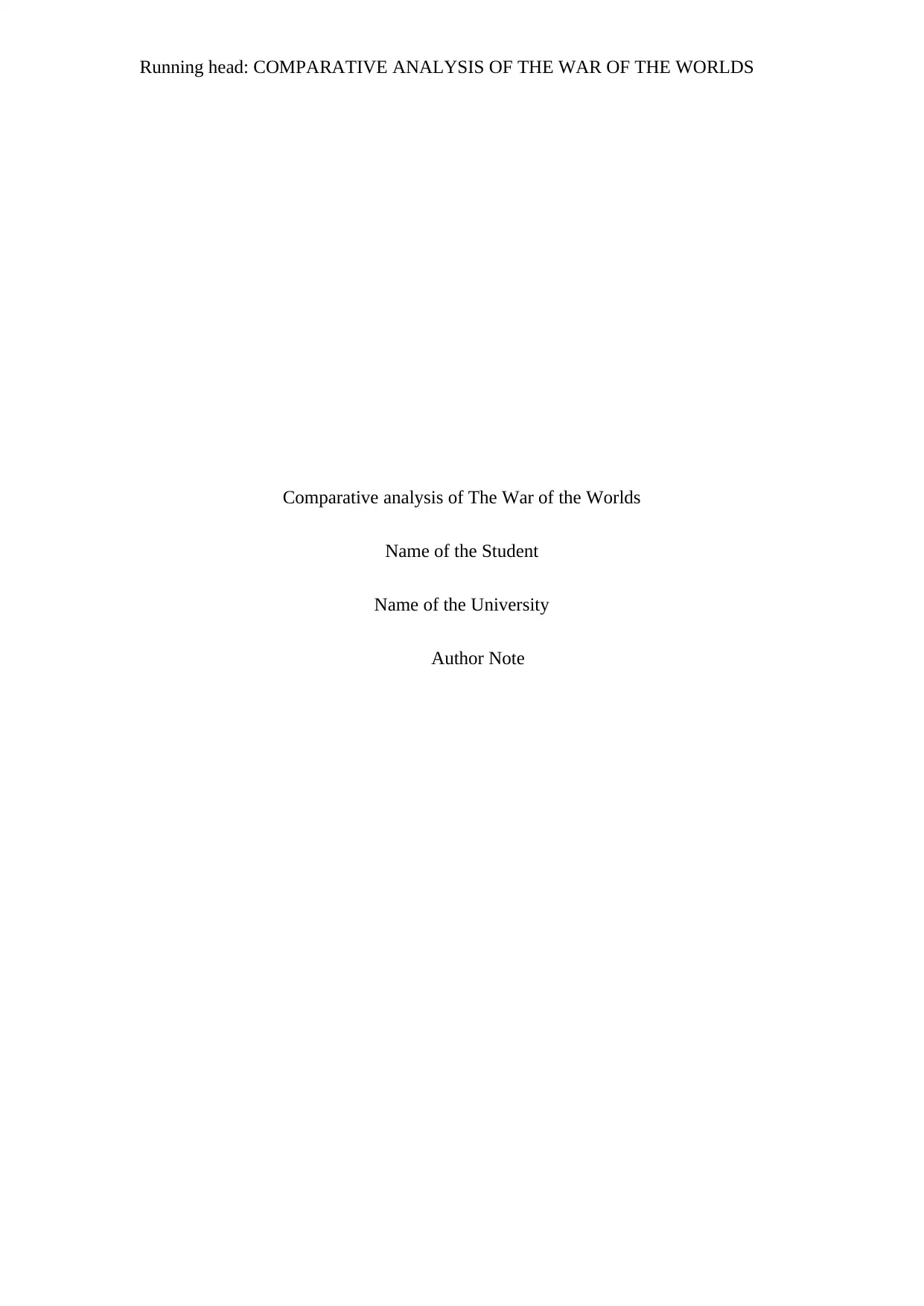
Running head: COMPARATIVE ANALYSIS OF THE WAR OF THE WORLDS
Comparative analysis of The War of the Worlds
Name of the Student
Name of the University
Author Note
Comparative analysis of The War of the Worlds
Name of the Student
Name of the University
Author Note
Paraphrase This Document
Need a fresh take? Get an instant paraphrase of this document with our AI Paraphraser
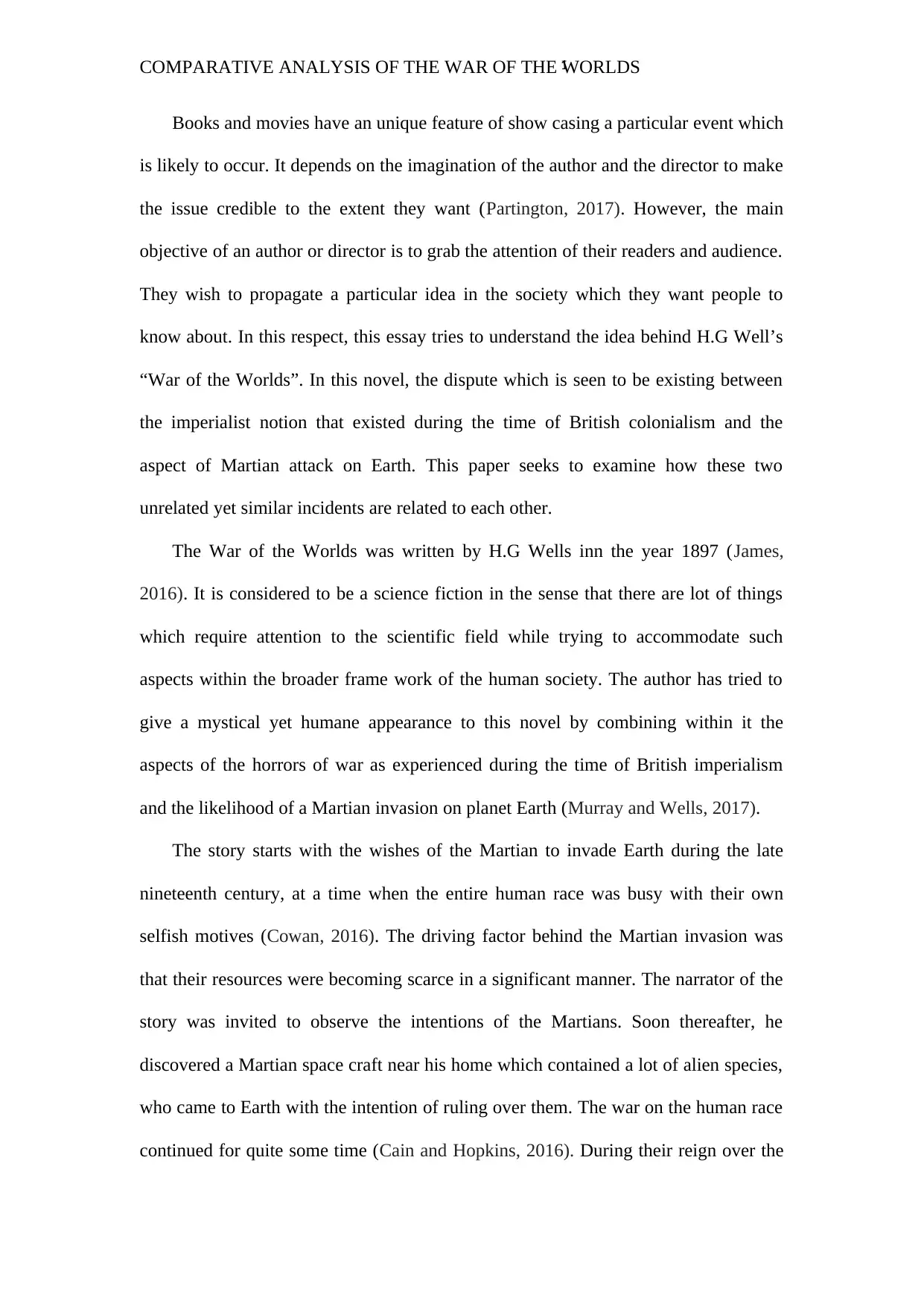
1COMPARATIVE ANALYSIS OF THE WAR OF THE WORLDS
Books and movies have an unique feature of show casing a particular event which
is likely to occur. It depends on the imagination of the author and the director to make
the issue credible to the extent they want (Partington, 2017). However, the main
objective of an author or director is to grab the attention of their readers and audience.
They wish to propagate a particular idea in the society which they want people to
know about. In this respect, this essay tries to understand the idea behind H.G Well’s
“War of the Worlds”. In this novel, the dispute which is seen to be existing between
the imperialist notion that existed during the time of British colonialism and the
aspect of Martian attack on Earth. This paper seeks to examine how these two
unrelated yet similar incidents are related to each other.
The War of the Worlds was written by H.G Wells inn the year 1897 (James,
2016). It is considered to be a science fiction in the sense that there are lot of things
which require attention to the scientific field while trying to accommodate such
aspects within the broader frame work of the human society. The author has tried to
give a mystical yet humane appearance to this novel by combining within it the
aspects of the horrors of war as experienced during the time of British imperialism
and the likelihood of a Martian invasion on planet Earth (Murray and Wells, 2017).
The story starts with the wishes of the Martian to invade Earth during the late
nineteenth century, at a time when the entire human race was busy with their own
selfish motives (Cowan, 2016). The driving factor behind the Martian invasion was
that their resources were becoming scarce in a significant manner. The narrator of the
story was invited to observe the intentions of the Martians. Soon thereafter, he
discovered a Martian space craft near his home which contained a lot of alien species,
who came to Earth with the intention of ruling over them. The war on the human race
continued for quite some time (Cain and Hopkins, 2016). During their reign over the
Books and movies have an unique feature of show casing a particular event which
is likely to occur. It depends on the imagination of the author and the director to make
the issue credible to the extent they want (Partington, 2017). However, the main
objective of an author or director is to grab the attention of their readers and audience.
They wish to propagate a particular idea in the society which they want people to
know about. In this respect, this essay tries to understand the idea behind H.G Well’s
“War of the Worlds”. In this novel, the dispute which is seen to be existing between
the imperialist notion that existed during the time of British colonialism and the
aspect of Martian attack on Earth. This paper seeks to examine how these two
unrelated yet similar incidents are related to each other.
The War of the Worlds was written by H.G Wells inn the year 1897 (James,
2016). It is considered to be a science fiction in the sense that there are lot of things
which require attention to the scientific field while trying to accommodate such
aspects within the broader frame work of the human society. The author has tried to
give a mystical yet humane appearance to this novel by combining within it the
aspects of the horrors of war as experienced during the time of British imperialism
and the likelihood of a Martian invasion on planet Earth (Murray and Wells, 2017).
The story starts with the wishes of the Martian to invade Earth during the late
nineteenth century, at a time when the entire human race was busy with their own
selfish motives (Cowan, 2016). The driving factor behind the Martian invasion was
that their resources were becoming scarce in a significant manner. The narrator of the
story was invited to observe the intentions of the Martians. Soon thereafter, he
discovered a Martian space craft near his home which contained a lot of alien species,
who came to Earth with the intention of ruling over them. The war on the human race
continued for quite some time (Cain and Hopkins, 2016). During their reign over the
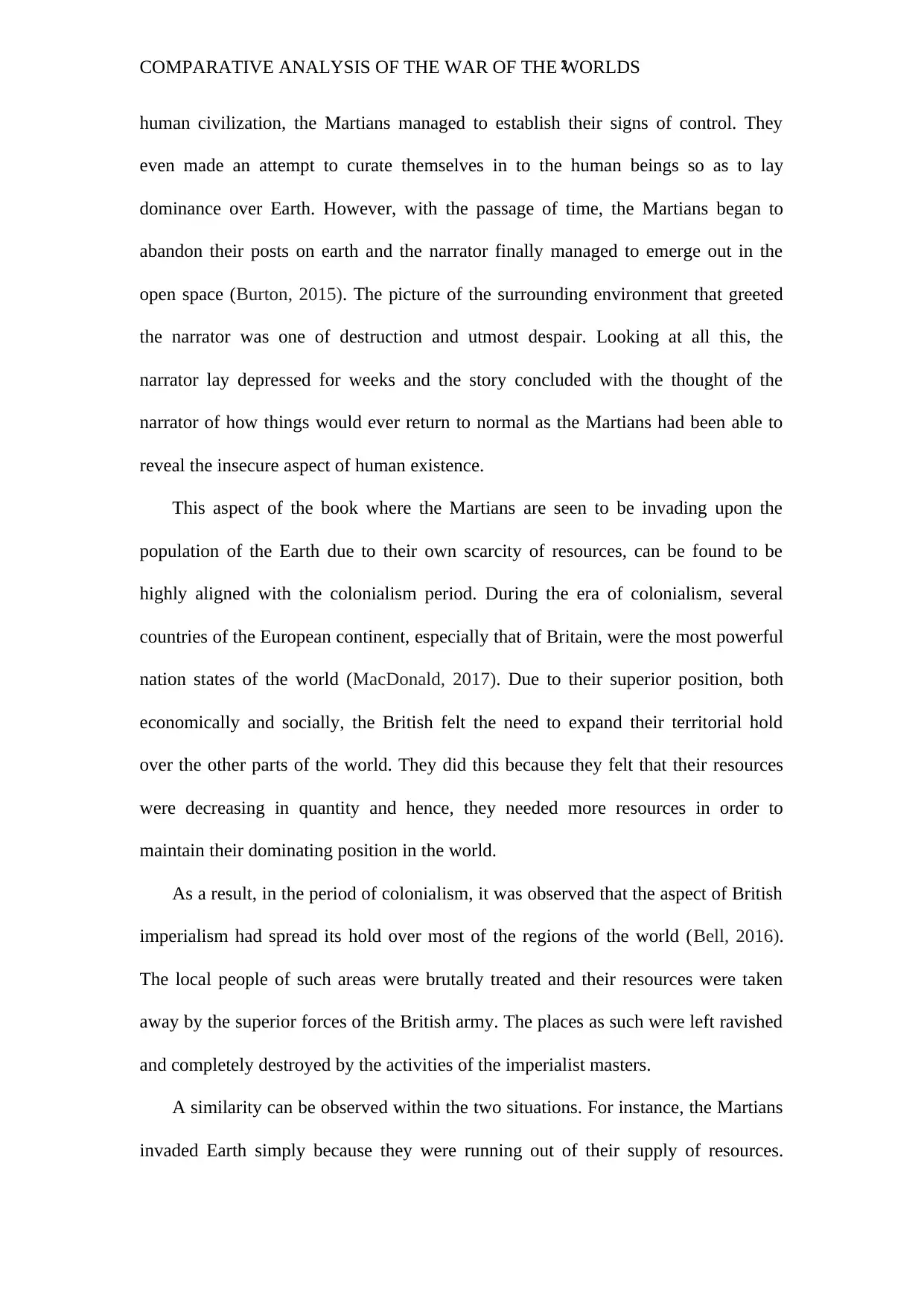
2COMPARATIVE ANALYSIS OF THE WAR OF THE WORLDS
human civilization, the Martians managed to establish their signs of control. They
even made an attempt to curate themselves in to the human beings so as to lay
dominance over Earth. However, with the passage of time, the Martians began to
abandon their posts on earth and the narrator finally managed to emerge out in the
open space (Burton, 2015). The picture of the surrounding environment that greeted
the narrator was one of destruction and utmost despair. Looking at all this, the
narrator lay depressed for weeks and the story concluded with the thought of the
narrator of how things would ever return to normal as the Martians had been able to
reveal the insecure aspect of human existence.
This aspect of the book where the Martians are seen to be invading upon the
population of the Earth due to their own scarcity of resources, can be found to be
highly aligned with the colonialism period. During the era of colonialism, several
countries of the European continent, especially that of Britain, were the most powerful
nation states of the world (MacDonald, 2017). Due to their superior position, both
economically and socially, the British felt the need to expand their territorial hold
over the other parts of the world. They did this because they felt that their resources
were decreasing in quantity and hence, they needed more resources in order to
maintain their dominating position in the world.
As a result, in the period of colonialism, it was observed that the aspect of British
imperialism had spread its hold over most of the regions of the world (Bell, 2016).
The local people of such areas were brutally treated and their resources were taken
away by the superior forces of the British army. The places as such were left ravished
and completely destroyed by the activities of the imperialist masters.
A similarity can be observed within the two situations. For instance, the Martians
invaded Earth simply because they were running out of their supply of resources.
human civilization, the Martians managed to establish their signs of control. They
even made an attempt to curate themselves in to the human beings so as to lay
dominance over Earth. However, with the passage of time, the Martians began to
abandon their posts on earth and the narrator finally managed to emerge out in the
open space (Burton, 2015). The picture of the surrounding environment that greeted
the narrator was one of destruction and utmost despair. Looking at all this, the
narrator lay depressed for weeks and the story concluded with the thought of the
narrator of how things would ever return to normal as the Martians had been able to
reveal the insecure aspect of human existence.
This aspect of the book where the Martians are seen to be invading upon the
population of the Earth due to their own scarcity of resources, can be found to be
highly aligned with the colonialism period. During the era of colonialism, several
countries of the European continent, especially that of Britain, were the most powerful
nation states of the world (MacDonald, 2017). Due to their superior position, both
economically and socially, the British felt the need to expand their territorial hold
over the other parts of the world. They did this because they felt that their resources
were decreasing in quantity and hence, they needed more resources in order to
maintain their dominating position in the world.
As a result, in the period of colonialism, it was observed that the aspect of British
imperialism had spread its hold over most of the regions of the world (Bell, 2016).
The local people of such areas were brutally treated and their resources were taken
away by the superior forces of the British army. The places as such were left ravished
and completely destroyed by the activities of the imperialist masters.
A similarity can be observed within the two situations. For instance, the Martians
invaded Earth simply because they were running out of their supply of resources.
⊘ This is a preview!⊘
Do you want full access?
Subscribe today to unlock all pages.

Trusted by 1+ million students worldwide
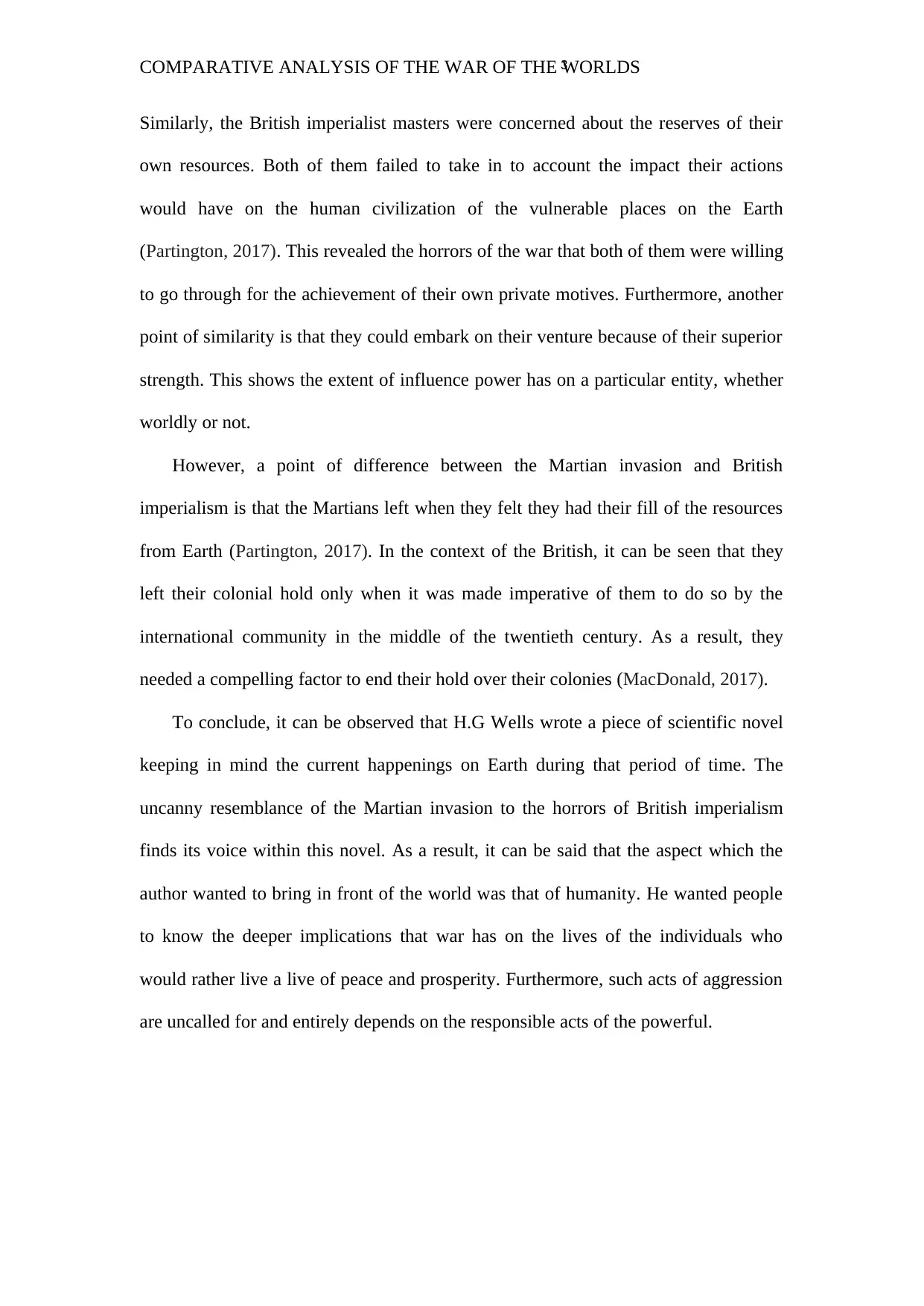
3COMPARATIVE ANALYSIS OF THE WAR OF THE WORLDS
Similarly, the British imperialist masters were concerned about the reserves of their
own resources. Both of them failed to take in to account the impact their actions
would have on the human civilization of the vulnerable places on the Earth
(Partington, 2017). This revealed the horrors of the war that both of them were willing
to go through for the achievement of their own private motives. Furthermore, another
point of similarity is that they could embark on their venture because of their superior
strength. This shows the extent of influence power has on a particular entity, whether
worldly or not.
However, a point of difference between the Martian invasion and British
imperialism is that the Martians left when they felt they had their fill of the resources
from Earth (Partington, 2017). In the context of the British, it can be seen that they
left their colonial hold only when it was made imperative of them to do so by the
international community in the middle of the twentieth century. As a result, they
needed a compelling factor to end their hold over their colonies (MacDonald, 2017).
To conclude, it can be observed that H.G Wells wrote a piece of scientific novel
keeping in mind the current happenings on Earth during that period of time. The
uncanny resemblance of the Martian invasion to the horrors of British imperialism
finds its voice within this novel. As a result, it can be said that the aspect which the
author wanted to bring in front of the world was that of humanity. He wanted people
to know the deeper implications that war has on the lives of the individuals who
would rather live a live of peace and prosperity. Furthermore, such acts of aggression
are uncalled for and entirely depends on the responsible acts of the powerful.
Similarly, the British imperialist masters were concerned about the reserves of their
own resources. Both of them failed to take in to account the impact their actions
would have on the human civilization of the vulnerable places on the Earth
(Partington, 2017). This revealed the horrors of the war that both of them were willing
to go through for the achievement of their own private motives. Furthermore, another
point of similarity is that they could embark on their venture because of their superior
strength. This shows the extent of influence power has on a particular entity, whether
worldly or not.
However, a point of difference between the Martian invasion and British
imperialism is that the Martians left when they felt they had their fill of the resources
from Earth (Partington, 2017). In the context of the British, it can be seen that they
left their colonial hold only when it was made imperative of them to do so by the
international community in the middle of the twentieth century. As a result, they
needed a compelling factor to end their hold over their colonies (MacDonald, 2017).
To conclude, it can be observed that H.G Wells wrote a piece of scientific novel
keeping in mind the current happenings on Earth during that period of time. The
uncanny resemblance of the Martian invasion to the horrors of British imperialism
finds its voice within this novel. As a result, it can be said that the aspect which the
author wanted to bring in front of the world was that of humanity. He wanted people
to know the deeper implications that war has on the lives of the individuals who
would rather live a live of peace and prosperity. Furthermore, such acts of aggression
are uncalled for and entirely depends on the responsible acts of the powerful.
Paraphrase This Document
Need a fresh take? Get an instant paraphrase of this document with our AI Paraphraser
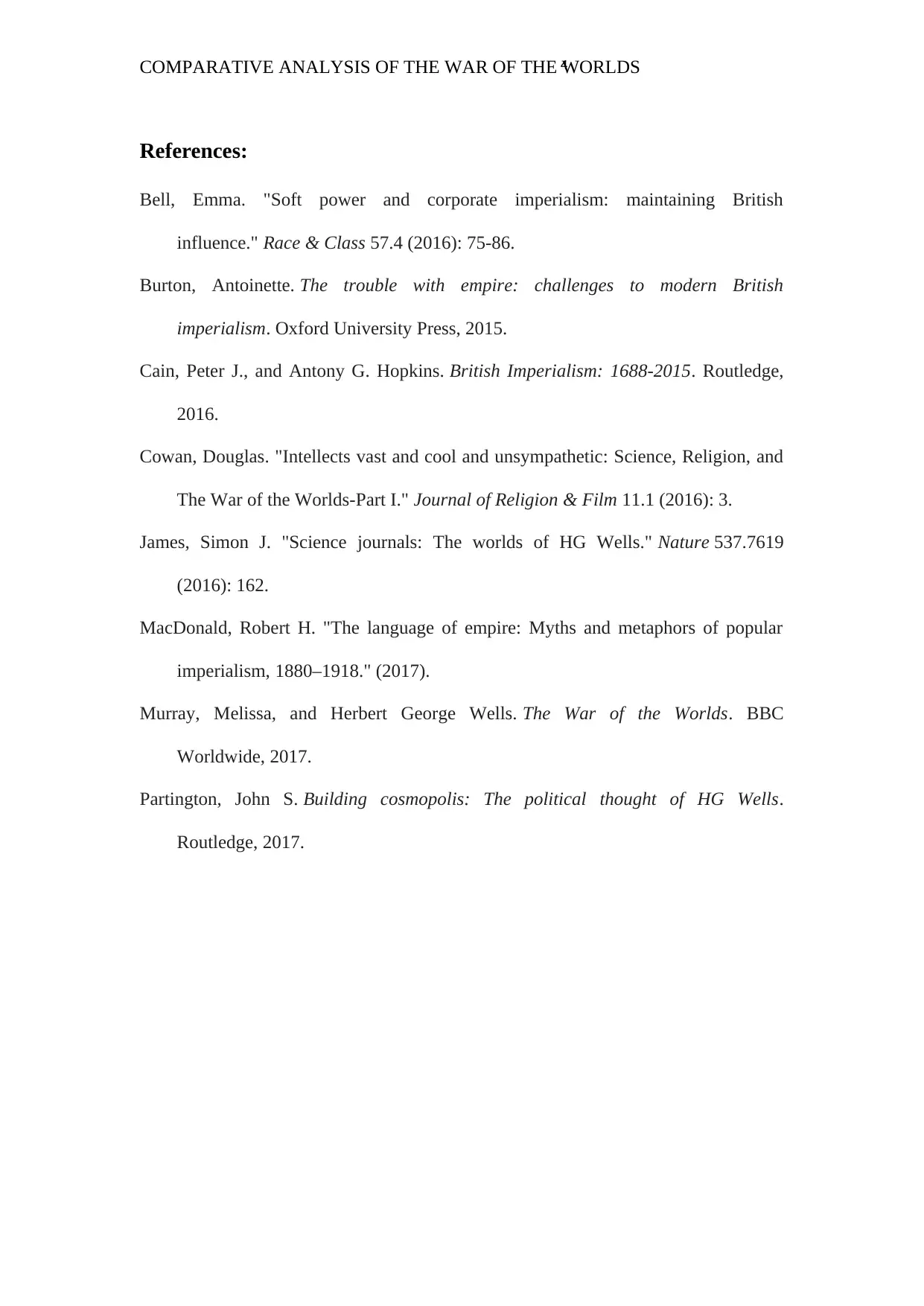
4COMPARATIVE ANALYSIS OF THE WAR OF THE WORLDS
References:
Bell, Emma. "Soft power and corporate imperialism: maintaining British
influence." Race & Class 57.4 (2016): 75-86.
Burton, Antoinette. The trouble with empire: challenges to modern British
imperialism. Oxford University Press, 2015.
Cain, Peter J., and Antony G. Hopkins. British Imperialism: 1688-2015. Routledge,
2016.
Cowan, Douglas. "Intellects vast and cool and unsympathetic: Science, Religion, and
The War of the Worlds-Part I." Journal of Religion & Film 11.1 (2016): 3.
James, Simon J. "Science journals: The worlds of HG Wells." Nature 537.7619
(2016): 162.
MacDonald, Robert H. "The language of empire: Myths and metaphors of popular
imperialism, 1880–1918." (2017).
Murray, Melissa, and Herbert George Wells. The War of the Worlds. BBC
Worldwide, 2017.
Partington, John S. Building cosmopolis: The political thought of HG Wells.
Routledge, 2017.
References:
Bell, Emma. "Soft power and corporate imperialism: maintaining British
influence." Race & Class 57.4 (2016): 75-86.
Burton, Antoinette. The trouble with empire: challenges to modern British
imperialism. Oxford University Press, 2015.
Cain, Peter J., and Antony G. Hopkins. British Imperialism: 1688-2015. Routledge,
2016.
Cowan, Douglas. "Intellects vast and cool and unsympathetic: Science, Religion, and
The War of the Worlds-Part I." Journal of Religion & Film 11.1 (2016): 3.
James, Simon J. "Science journals: The worlds of HG Wells." Nature 537.7619
(2016): 162.
MacDonald, Robert H. "The language of empire: Myths and metaphors of popular
imperialism, 1880–1918." (2017).
Murray, Melissa, and Herbert George Wells. The War of the Worlds. BBC
Worldwide, 2017.
Partington, John S. Building cosmopolis: The political thought of HG Wells.
Routledge, 2017.
1 out of 5
Your All-in-One AI-Powered Toolkit for Academic Success.
+13062052269
info@desklib.com
Available 24*7 on WhatsApp / Email
![[object Object]](/_next/static/media/star-bottom.7253800d.svg)
Unlock your academic potential
Copyright © 2020–2026 A2Z Services. All Rights Reserved. Developed and managed by ZUCOL.

